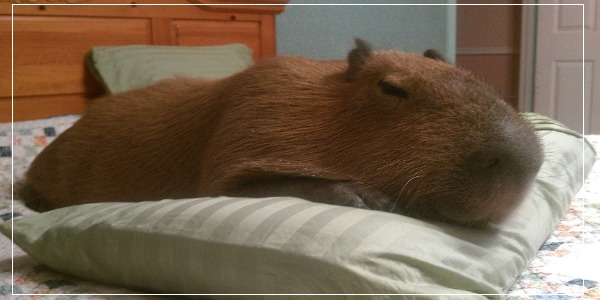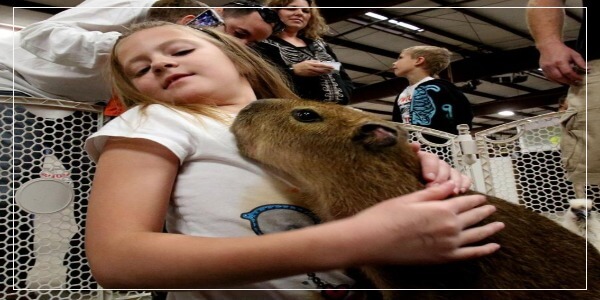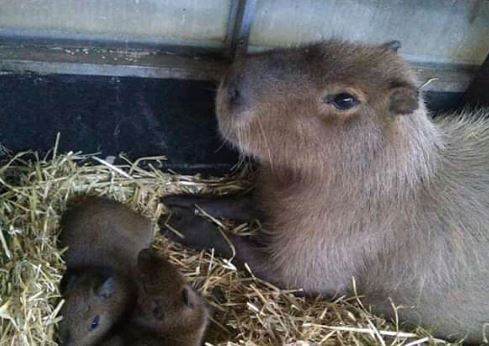Should I Let My Capybara Sleep on My Bed with Me?
Many pet owners, even those with the best of intentions, are often reluctant to let their animals share a bed because they think it’s unhealthy. But while there are certainly some species (like cats) that should never be allowed to sleep in your bed, capybaras don’t pose any health risks — as long as you take proper precautions.
For starters, remember that capybaras aren’t generally very social animals and will only want to sleep in your bed if they feel safe around you. If you have a naturally aggressive capybara who’s not getting enough exercise or is lacking attention from its owner, it may start attacking random things around the house — which could include other pets or even people!
The best way to avoid this situation is by giving your capybara plenty of space when sleeping on your bed; get it used to being alone for long periods of time at least once every few days and keep toys nearby so it doesn’t grow bored too quickly.
If you’re afraid that letting your capybara sleep in the same room as you’ll encourage territorial behavior toward other animals/humans, then consider making sure there are no other human beds available during evening hours (or keeping them out completely). You can also use soft music and scents like lavender oil or peppermint tea leaves near where they sleep so they won’t feel anxious about having strangers around while they rest—and if all else fails then just put some food near their spot!
Rep your cute capybara purchase a T-shirt
Capybaras enjoy sleeping in beds with humans if given the opportunity.
It cannot be understated that capybaras enjoy sleeping in or on beds with their owners. They will sleep above the blankets, and if given a chance, they will definitely curl up against your body to nap. This is most likely due to capybaras’ social nature, which would have them sleeping close to many other animals in their natural environment. The more time they spend with you, the more comfortable they become being close to you, even while they rest.
If you’re worried about your capybara damaging your bedclothes with its claws or teeth, don’t worry! Capybaras aren’t usually destructive while they sleep, so it’s unlikely that your pet will chew or shred anything it shouldn’t.
Capybaras should not be allowed to sleep on owner’s bed if the owner does not feel comfortable sharing their beds with large rodents.
While many pet owners are very attached to their pets, it is important that you find a way to express this affection without making yourself feel uncomfortable. If you don’t like the idea of sharing your bed with a large rodent, it is probably not a good idea to force yourself to do so.
My philosophy on this topic is that each and every capybara owner must take the time to determine for themselves whether or not they should allow their pet to sleep in their beds. There really is no right or wrong answer; whatever makes you happiest and healthiest should be your primary concern.
Capybaras are very heavy creatures and can crush or suffocate small children.
Mistakenly, a capybara owner might think, “I should let my giant semi-aquatic rodent sleep on my bed.” However, this is actually a very bad idea for little infants. First of all, capybaras are very heavy creatures and can crush or suffocate small children. Second of all, capybaras are wild animals except properly domesticated ones over time.
They aren’t like dogs or cats and may in fact eat your face while you sleep. It is best to keep your capybara as far away from your bed as you possibly can if you aren’t so sure of the outcome!
In some cases, capybaras may become hostile if they do not feel safe and may bite the owners.
In some cases, if a capybara doesn’t feel safe it may become hostile and bite. Capybaras are not known to attack humans unless provoked, but if they do manage to injure you with their large teeth, they can cause serious wounds that require medical attention.
Capybaras can also bite by accident when playing with their owners. Because of the strength of their jaws and large teeth, a capybara might not realize how hard it is biting down until it’s too late.
Some people have allergies to capybaras and other animals, so they cannot sleep in their beds with them.
In the wild, capybaras are herd animals that live in water, so when they sleep in the presence of their owners, some people feel comforted by their presence. However, some people have allergies to capybaras and other animals and therefore cannot sleep with them in their beds. If you are allergic to capybaras or other animals, be sure not to get one. Capybaras shed hair regularly and also have a distinctively strong odor which might be unpleasant for some people with allergies.
Can Capybaras Wear Clothes – Can I Dress My Capybara? – [Answered]
Capybaras should only be allowed to sleep in the same bed as their owners if those owners feel comfortable sharing their space with large rodents.
- Capybaras should only be allowed to sleep in the same bed as their owners if those owners feel comfortable sharing their space with large rodents.
- Capybaras should not be allowed to sleep on the owner’s bed if the owner does not feel comfortable sharing their beds with large rodents.
Whether or not you allow your capybara to share a bed with you is a personal decision and one that must be made by each pet-owner pair individually. There are many considerations to keep in mind when deciding if it is appropriate for your capybara to share a bed with you, including but not limited to:
- Your comfort level around large rodents
- The comfort level of other humans in the household, particularly those of sleeping partners and roommates
- The sleeping habits of both humans and capybara









